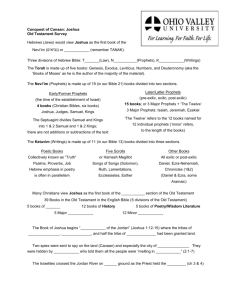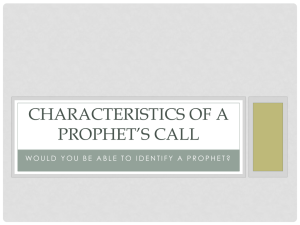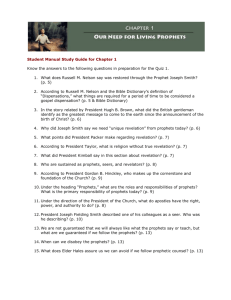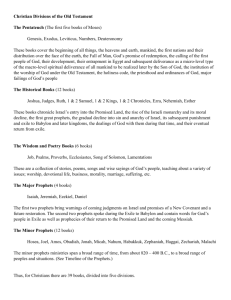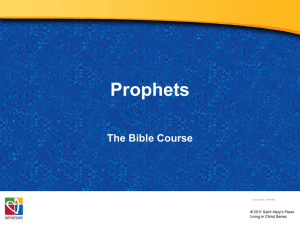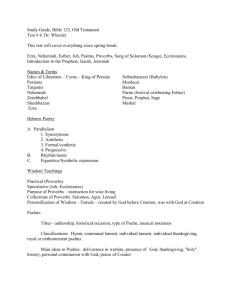3A Intro to Hist Bks and JOSHUA PPT
advertisement
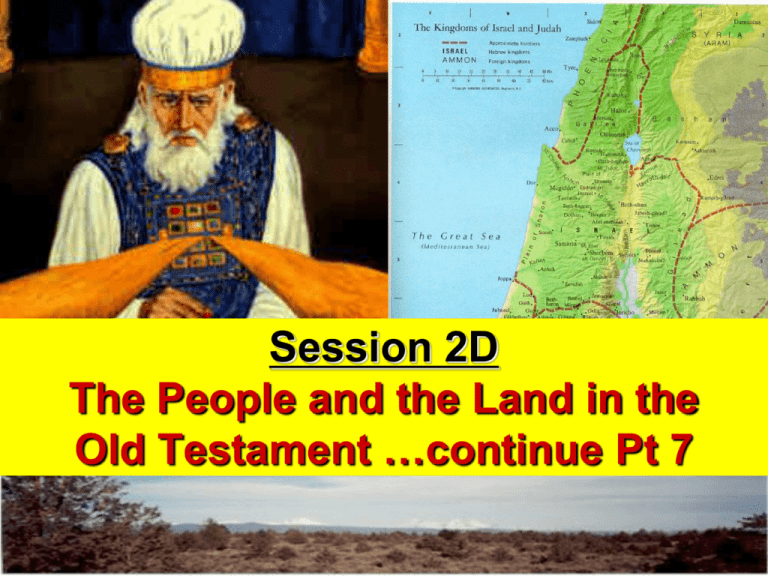
Session 2D The People and the Land in the Old Testament …continue Pt 7 Session # 3A Introduction to Historical Books & Joshua HISTORICAL (17) LAW (5) Genesis Exodus Leviticus Numbers Deuteronomy HISTORICAL (12) Former Prophets Joshua Former Prophets Judges Writings Ruth Former Prophets 1 Samuel Former Prophets 2 Samuel Former Prophets 1 Kings Former Prophets 2 Kings 1 Chronicles Writings 2 Chronicles Writings Writings Ezra Nehemiah Writings Esther Writings POETICAL (5) Job Psalms Proverbs Ecclesiastes Song of Songs HEBREW SCRIPTURE 1. TORAH 2a. FORMER PROPHETS 2b. LATTER PROPHETS 3. WRITINGS PROPHETICAL (17) MAJOR (5) Isaiah Jeremiah Lamentations Ezekiel Daniel MINOR (12) Hosea Joel Amos Obadiah Jonah Micah Nahum Habakkuk Zephaniah Haggai Zechariah Malachi Latter Prophets Latter Prophets Writings Latter Prophets Writings Monarchy HISTORICAL CONTENT CHRISTIAN OLD TESTAMENT: Historical Books (In chronological order) HEBREW SCRIPTURES: HEBREW SCRIPTURES: Writings Former Prophets (Hagiographa) Conquest 1. Joshua Pre-monarchy Judges 2. Judges United Kingdom Saul 3. 1 Samuel David 4. 2 Samuel Solomon Divided Kingdom Israel in the north (922-722 BC) Judah in the south (922-586 BC) 5. 1 Kings 7. Ruth: Story of faithfulness in the midst of unfaithfulness 8. 1 Chronicles 9. 2 Chronicles (Retelling the story of the Kings from a theological hindsight) 6. 2 Kings Return: Rebuilding the People 10. Ezra Preservation of Jews in Persia 11. Esther Return: Rebuilding the Wall 12. Nehemiah THE FORMER PROPHETS 4) Why “Former Prophets?” a) They relate the early history of prophecy. They wrote the national history of Israel in the light of theological and prophetic interests. I) II) I) Relationship Between History and Prophecy (i) Prophecy is not primarily futuristic, but concerned with obedience in time and space, in the here and now. (ii) Prophecy looks to the covenants of the PAST and interprets their significance for the PRESENT as well as FUTURE. The medium it uses to tie the PAST to the PRESENT is HISTORY. THE FORMER PROPHETS 4) a) Why “Former Prophets?” III) Jewish tradition believes that these historical books were indeed written by prophets. c) General Statement on Authorship i) All of the historical books are actually anonymous. ii)The title of each book indicates subject matter of a particular book, and usually does not claim direct correspondence to authorships even though the key character for which the books are named may have been the source of most the materials that bears their names. JOSHUA A. TITLE c) The book is named for the principal character, Joshua, whose name means “the LORD is salvation” or “the LORD saves.” 2) THE PERSON OF JOSHUA Originally, his name was Hoshea, but Moses changed it to Joshua (Num 13:8, 16) OUTLINE a) The defeat of the land (1—12) b) The distribution of the land (13—21) c) The dedication of the people to live in the land (22—24) d. Overall Lesson from Joshua i) God is in control of events in history. (1)Joshua 11:23 (2)Joshua 21:43-45 (3)The idea that God gave the land is found more than 50 times in the book. That it is a fulfillment of the land promised to Israel’s ancestors is also emphasized (11:23; 21:4345). In this way, God emerges as a trustworthy Sovereign, as one who keeps his promises. This is also emphasized in Joshua’s farewell speeches ( ch. 22-24).
